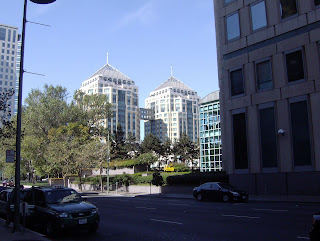Friday, October 29, 2010
English as facade
Monday, October 18, 2010
New Future for Old Movies
Went to a film festival, --man was it fun to be in a crowded theater with an enthusiastic undergraduate crowd watching a classic. Michael Bérubé organized the “Bad Futures” film series this weekend as part of the Institute for Arts and Humanities. There are so many excellent things about a film festival
first, you see the movie on a giant screen, which really makes a ‘huge’ difference, especially if you are watching Stanley Kubrick’s 2001: A Space Odyssey You cannot experience the cinematic sublime on a small screen. Just as rock bands are better live, so too movies are better in a cinema.
Second, the lobby was crowded with intensely wound up audience members all mingling about talking, getting snacks, watching each other. I was able to have more than a few conversations about the movie! How exciting is that! See a work of art, talk about it with other members of the audience. Much as I enjoy downloading movies, I relish hanging out and discussing the films with smart people I don’t normally get to see. This sense of a shared intellectual experience in public—get your Habermas ready, folks—inspires the audience to even more thought. A video going viral is the lonely version of an exciting evening at the theater.
Back in the seventies, when New York City had long stretches of low-rent sleaze, there were theaters up and down Broadway and across Bleecker St. that showed no end of great old movies, and the latest foreign releases. I got to see Truffaut to my hearts content, but also obscure Italian releases that barely made it over the ocean and ran for just a week. I remember vividly going to see “Il Prato” which the New York Times listed as interesting because it was the first major film performance by the daughter of Ingrid Bergman and Roberto Rossellini. I really liked Ingrid Bergman, so my friend Andrew and I wandered off to see Isabella Rossellini in a love triangle loosely based on Goethe’s The Sorrows of Young Werther with an Italian Marxist context. Instead of committing suicide, the unhappy lover dies of rabies after being bitten by a wild dog. Good stuff. Something about growing up in Queens in the 70s made me want to trek into the city to see the kind of movies television did not broadcast. If only I had started a movie company like the Weinstein brothers, rather than go to grad school. Living in the outer borough, you were close enough to see what was available in Manhattan, and yet far enough away still to really desire it intensely.
The point is that seeing films in a cinema with friends around where you can discuss and then reminisce about the movies adds enormously to the experience. Film festivals are well-suited to college campuses. Manhattan no longer has old movie houses, but the camaraderie and curiosity of universities makes them the perfect place to gather together in front of the big screen and then to talk, talk, talk about it afterwards, maybe even write the occasional blog entry as well.
Saturday, October 16, 2010
Oakland
Friday, October 15, 2010
Critical Tenacity
Saw for the first time the author, psychoanalyst and former political prisoner, Karl-Heinz Bomberg, here on campus at a series of events hosted by Greg Eghigian. Bomberg has a warm, intense presence and a touch of the ancient Mariner, who stoppeth one in three. Listening to him talk about the psychological impact of being imprisoned in Communist Germany, I was struck by how urgent the topic still was in the moment, and yet how quickly contemporaries want to forget about all that.
There is a tendency, in myself as in others, to let the tortures of totalitarianism slip away into quiet forgetfulness. Hearing Ingrid Miethe a feminist historian at the University of Giessen speak at the recent German Studies Association conference brought across the same point. Miethe spoke about East German feminists with a lively polemical tone as if the DDR and its women’s movement were still in existence. She still spoke in the present tense about family and social policies that have been overrun by the West.
Miethe and Bomberg have a trait in common with the Nobel laureate, Herta Müller, namely the continued analysis, critique and revision of life under Communism. They surely do not share the same experiences nor hold the same political positions today, but for all three the Communist system has an actuality that most Westerners (with the exception of right-wing conservatives) and many Easterners who were born under Communism no longer recognize. Their engagement has nothing to do with nostalgia, it is more a sign of critical tenacity. Whereas right-wingers scare their listeners by talking about Socialism as if it were everywhere, these three writers preserve the vanishing reality of Communism because it is an inescapable part of their lives.
Tuesday, October 12, 2010
The GSA Experience
This year the conference was organized according to themes, which to some grad student in the future will give a fair summary of the buzz words big in 2010: money, cosmopolitanism, transnationalism, and cities were among the mix. But then again, these terms show themselves at most any humanities conference these days.

